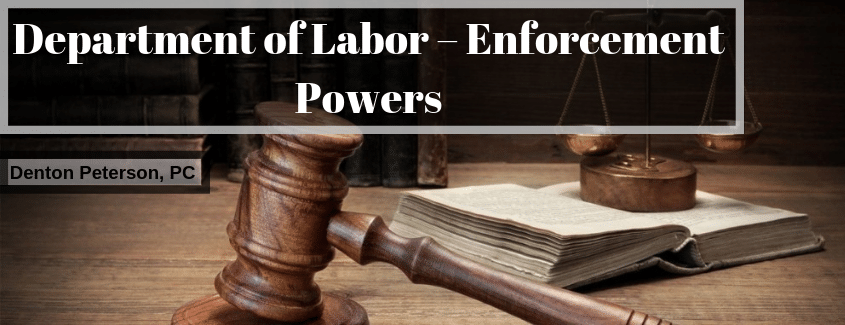Department of Labor – Enforcement Powers
The Department of Labor(“the Department”) is a highly complex federal agency charged with the broad task of protecting and promoting the rights of “workers, job seekers, and retirees” through “improv[ing] job conditions, advanc[ing] opportunities for employment, and assur[ing] work-related benefits and rights.” The Department consists of 27 different agencies, including the Employee Benefits Security Administration (“ESA”), the Wage and Hour Division, the Employment and Training Administration (“ETA”), the Bureau of Labor Statistics (“BLS”), and the Occupational Safety and Health Administration (“OSHA”). In carrying out its mission, the Department administers and enforces a variety of Federal labor laws,1 including laws that guarantee workers’ rights to safe working conditions, minimum hourly wage and overtime pay, freedom from discrimination in the workplace, unemployment insurance, and other income support. This article discusses where the Department of Labor’s power comes from and how it enforces labor and employment laws in order to achieve its purpose of improving and advancing the rights and benefits of workers.

Where does the Department of Labor’s power come from?
The Department of Labor,2 headed by the U.S. Secretary of Labor, is a federal agency and thus receives its authority directly from the executive branch of the United States. Thus, the scope of the Department’s power as a whole will depend on the presiding President in office. For this reason, the Washington Post noted that “there are few federal agencies where the ideological differences separating many Democrats and Republicans play out more plainly” than the Department of Labor. Not surprisingly, this means that there is quite a significant turnover with the flip flopping the presidential office ever four to eight years. Currently, the Department works under a Secretary of Labor appointed by President Trump and has generally taken actions more favorable to employers in what it considers it to be part of its “pro-business” agenda.
How does the Department of Labor legislate labor and employment laws?
Before jumping into how labor and employment laws are enforced by the Department, it is important to understand how the Department advises and make rules. Rulemaking generally refers to the actions involved with a government agency creating, modifying, or deleting rules in the Code of Federal Regulations, which generally implement, explain, or prescribe law or policy. In addition to Federal Regulations, the Department releases guidance documents, such as: opinion letters, Ruling letters, administrator interpretations, and field assistance bulletins. Such guidance documents can be highly persuasive for administrative, civil, and criminal judges when they are interpreting statutory and regulatory provisions. Also, the Department provides important statistics related to employment, labor enforcement participation rates, unemployment, and inflation. Though rulemaking might not seem as significant as enforcement, it is critical to the Department’s mission of promoting employee rights.
How does the Department of Labor enforce labor and employment laws?
Most executive agencies are represented by the Department of Justice, which is empowered to handle all criminal prosecutions and civil suits in which the United States has an interest; however, the Department of Labor, along with a few other agencies, is unusual in that it can litigate on its own behalf.3 It follows that the enforcement powers of the Department are broad and powerful. Here are several ways in which the Department enforces labor and employment laws:
Selection and Investigation
Audits and investigations are perhaps one of the best ways the Department enforces labor and employment laws. Fortunately for employers, the Department is not capable of auditing everyone. The Department selects businesses to audit for a number of reasons, including:
- A present or former employee filed a complaint with the Department against a business based on personal experiences;
- A third-party (e.g., competitor, agency, labor union) filed a complaint based on a belief that the business was not in compliance with the law;
- The business has been found to be noncompliant in a previous audit and the DOL is following up to ensure that such violations have been corrected;
- A business is part of an industry that the Department is concentrating its efforts on to find out the extent of compliance across the industry; and/or
- The business has been randomly selected.
Selection is critical in enforcing labor and employment laws because it directs the Department’s efforts to check up on and enforce the laws they find to be most important. In many ways, what to enforce is just as critical as how to enforce it.
Once the selection is made, auditors from the Department will investigate a business to determine what laws and regulations it may or may not be following. Here, there is not a rigid means for the auditor to enforce laws. Where violations of labor laws are found, investigators may recommend changes in employment practices to bring an employer into compliance. Based on the willingness and efforts of the employer, an auditor might choose to give warnings and assist the employer in following the law. On the other hand, if an auditor so chooses, he or she may enforce the law by assigning fees and penalties to the employer.
Administrative Procedures
Generally, remedies may be recovered through administrative procedures. While there are a number of administrative actions that can be taken by the Department, settlements with employers and civil money penalties are perhaps some of the most common. For example, in settling with employers, the Department can seek back wages and liquidated damages in lieu of litigation. In addition, the Department may assess civil money penalties for certain labor and employment law violations and for repeat and/or willful violations of certain requirements. Civil money penalties will ultimately vary based on the violation of the employer and the specific agency within the Department handling the case.4 Ultimately, administrative procedures, including penalties and employer settlements, have advanced the effectiveness of the Department’s enforcement because they are efficient and effective in deterring employers from non-compliance.
Civil Litigation
One unique aspect of the Department is that it can file a civil lawsuit on behalf of a business’ employee as well as seek injunctions to restrain further violations of the law by an employer. The Department’s lawsuit is only limited by an employee’s personal lawsuit in recovering back wages and liquidated damages on the employee’s behalf.
Criminal Prosecution
When an employer’s conduct has constituted a willful violation of the law, that employer could be subject to criminal penalties, including imprisonment and fines, in addition to civil and administrative penalties and fines. Typically, criminal prosecution is saved for the particularly egregious employer crimes. For example, just recently an employer “was sentenced to serve fourteen (14) months in a federal penitentiary and three (3) years of supervised release, ordered to pay restitution in the amount of $139,960, and assessed a $100 penalty.” The employer was found to have embezzled money, in violation of 29 U.S.C. 501(c). For more horror stories of employers who received criminal enforcement actions by the Department, visit the Department of Labor website.
___________________________________________________
The Department of Labor’s rulemaking and enforcement authority is broad and can carry enough weight to make or break your business if you are not in compliance with labor and employment laws. Remember, the Department of Labor is not the only agency with the power to enforce labor and employment laws. You must also take into consideration state agencies as well. If you have any questions about the Department’s enforcement procedures or your compliance with current labor and employment laws, please contact our office today to speak with one of our experienced labor and employment attorneys.
_________________
1 The Department “administers and enforces more than 180 federal laws. These mandates and the regulations that implement them cover many workplace activities for about 10 million employers and 125 million workers.”
2 The U.S Secretary of Labor is appointed by the President of the United States.
3 Michael Herz & Neal Devins, The Consequences of DOJ Control of Litigation on Agencies’ Programs, 52 Admin. L. Rev. 1345, 1345-49 (2000).
4 For Wage and Hour Division civil money penalty amounts, see the United States Department of Labor Wage and Hour Division website.
_________________
Approved By:

Brad Denton – Denton Peterson, PC
1930 N Arboleda #200
Mesa, AZ 85213
Office: 480-325-9900
Email: [email protected]
Website: dentonpeterson.com